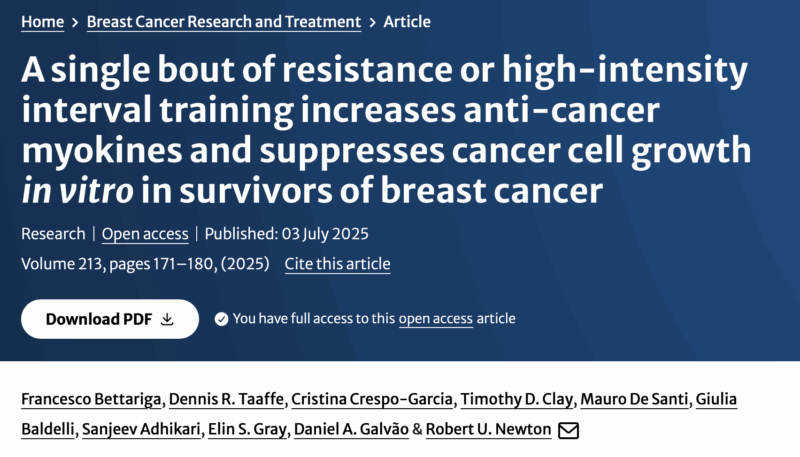Jasmin Hundal, Chair of Hematology-Oncology Research Fellowship Working Group at Cleveland Clinic, shared a post on LinkedIn about a recent article by Francesco Bettariga et al. published in Breast Cancer Research and Treatment:
“A single exercise session may slow cancer cell growth!
A new randomized study of breast cancer survivors by Bettariga et. al., demonstrated a measurable increase in anti-cancer myokines in the blood after just one bout of high-intensity interval training (HIIT) or resistance training, researchers found. These myokines include molecules such as IL-6, decorin, SPARC, and OSM.
When this ‘exercise-conditioned serum’ was applied to breast cancer cells in the lab, cancer cell growth slowed by nearly 20–29%. HIIT triggered the strongest IL-6 response and the most potent suppression, but both training modes produced significant effects.
Why does this matter?
For years, observational studies have consistently shown that survivors who exercise regularly have lower recurrence rates and improved survival outcomes. Now, we are seeing how exercise may directly influence tumor biology, through skeletal muscle acting as an endocrine organ, releasing powerful molecular signals with anti-cancer properties.
This research reframes exercise:
- Not just as “supportive care” for fatigue or quality of life
- But as a biological therapy that interacts with the same cellular pathways we target with drugs
- Accessible, low-risk, and scalable, with implications across survivorship and prevention
Important caveats remain: these are in vitro results, short-term signals, and not yet direct evidence of reduced recurrence. But they provide a crucial mechanistic bridge between population-level data and the biology happening inside patients.
As oncologists and healthcare leaders, we should ask:
- How do we normalize exercise prescriptions alongside chemotherapy, endocrine therapy, and immunotherapy?
- How do we design programs that are safe, progressive, and individualized, so survivors can access these benefits regardless of baseline fitness or treatment side effects?
- How do we fund and scale survivorship models where exercise is considered first-line care, not an afterthought?
It’s time to embed this knowledge into oncology care and survivorship planning because exercise is not ‘extra.’
Title: A single bout of resistance or high-intensity interval training increases anti-cancer myokines and suppresses cancer cell growth in vitro in survivors of breast cancer
Authors: Francesco Bettariga, Dennis R. Taaffe, Cristina Crespo-Garcia, Timothy D. Clay, Mauro De Santi, Giulia Baldelli, Sanjeev Adhikari, Elin S. Gray, Daniel A. Galvão, Robert U. Newton
Read the Full Article on Breast Cancer Research and Treatment

More posts featuring Jasmin Hundal.


